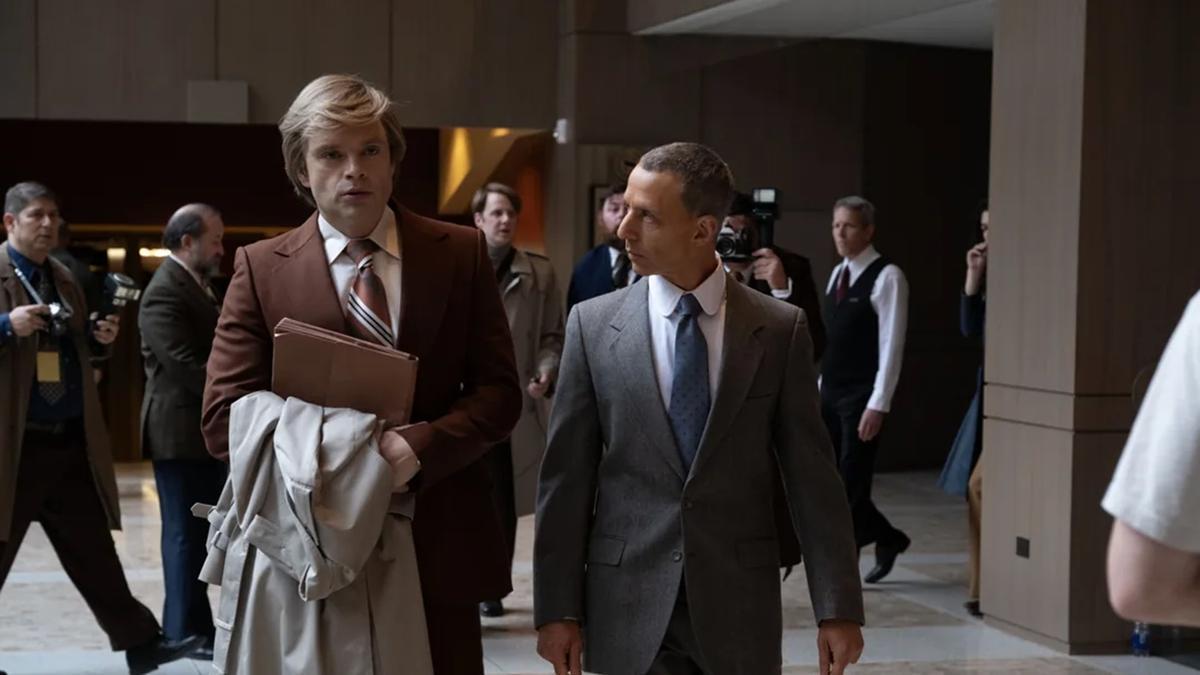
Ali Abbasi’s film, “The Apprentice,” offers a visceral exploration of the transformation of a young Donald Trump from an ambitious real estate scion into the figure that would later dominate headlines worldwide. However, differing from the usual media portrayal of Trump’s chaotic trajectory, the film delves into the philosophical quandary of how power corrupts those ripe for it, and examines how Trump, with the right — or wrong — mentor, spiraled ambition into moral decay.
Sebastian Stan undertakes the formidable role of portraying a nascent Trump, as yet unburdened by the gaudy persona he flaunted in later years. Stan embodies Trump’s distinctive physicality with unsettling precision; he perfectly mirrors Trump’s exaggerated pout, the distinctive flailing hand gestures, and trademark slack-jawed smirk, making his depiction eerily authentic.
Beyond mere mimicry, it is Stan’s portrayal of Trump’s evolving psyche that truly captivates. Early in his journey, Trump is portrayed as a man grasping for identity, yet instinctively inclined to break moral codes in pursuit of significance—a significance that eventually manifests as a specter haunting the political arena of the United States for years to come.
Central to the narrative is Trump’s complex relationship with Roy Cohn, portrayed with chilling acuity by Jeremy Strong. Known for his ruthless legal campaigns including the notorious Rosenberg case, Cohn comes alive on screen as a Machiavellian figure weaving through the fabric of Trump’s life, casting shadows of manipulation and moral flexibility over his protégé.
In the hands of Strong, Cohn is not merely an unsympathetic character but a calculating maestro orchestrating Trump’s darker proclivities. Cohn recognizes in Trump a reflection of his own willingness to flout ethical boundaries – a man unrestrained in pursuit and pliant to his influence. As a virulently homophobic lawyer, Cohn forms a bond with Trump that is predicated on shared malfeasance and moral turpitude, fostering loyalty through depth of depravity.
The film expertly interweaves the strands of a political biopic with the undercurrents of a twisted bromance. Abbasi delivers, as the pair nurture a relationship marred by corruption and an almost decadent sense of camaraderie. Their interactions hum with a queasy undercurrent, charged with an implicit eroticism manifest in their conspiratorial glances and banter — a testament to Abbasi’s deft handling of subtle cinematic tension.
Both Strong and Stan contribute sterling performances, crucial to sustaining the tension and believability of the story. Strong, with a veneer of calculated indifference, layers Cohn with an intense cynicism, revealing a figure capable of emotional manipulation with clinical ease.
. His directives to Trump on everything from media manipulation to judicial coercion seem forebodingly prescient, laying the groundwork for a future rife with scandal and controversy.
Stan’s rendition of Trump is a compelling contradiction – a buffoonish yet terrifying character, rendering a young Trump almost pitiable at times, until one recalls the callous ambition glinting in his eyes. The layered complexity in Stan’s portrayal ensures that viewers are steeped in empathy but simultaneously reminded of the looming threat his character poses.
Abbasi’s direction amplifies the sense of unease permeating “The Apprentice.” The New York City of the 1970s is portrayed in stark contrasts – both decadently luminous and insidiously decaying, a fitting backdrop for the unraveling story. Thanks to the cinematography of Kasper Tuxen, the film captures an aesthetic that mirrors its thematic exploration of moral and urban decay, with vivid imagery blending glitzy neon and gritty realism.
Injecting humor amidst the stark narrative, the film’s screenplay tinges the unfolding drama with dark comedy. Moments of absurdity, such as Trump’s obsession with his hair or Cohn’s sartorial advice, engender laughter that is swiftly muted by the film’s unrelenting descent into the moral abyss. Abbasi strikes a fine balance, employing comedy strategically to highlight grotesque undertones lurking beneath the surface.
Despite its prowess, “The Apprentice” does stumble slightly in its latter sections, edging too towards sensationalism over psychological exploration. A vividly portrayed scene of alleged sexual assault disrupts the film’s established tone, detracting from the nuanced character study that the film builds in its earlier acts.
Ultimately, “The Apprentice” transcends being a mere indictment of a polarizing figure. It reflects on the birth of a myth – the shaping of Trump’s public persona as a perennial victor. The film evokes classical tragedy, save for the fact that the protagonist never falls—highlighting, through Stan and Strong’s formidable performances, a national tragedy unfolding as spectators watched, yet failed to thwart. Originally slated for wider release, the movie delayed its Indian theatrical opening following an uncut and uncensored special preview.












